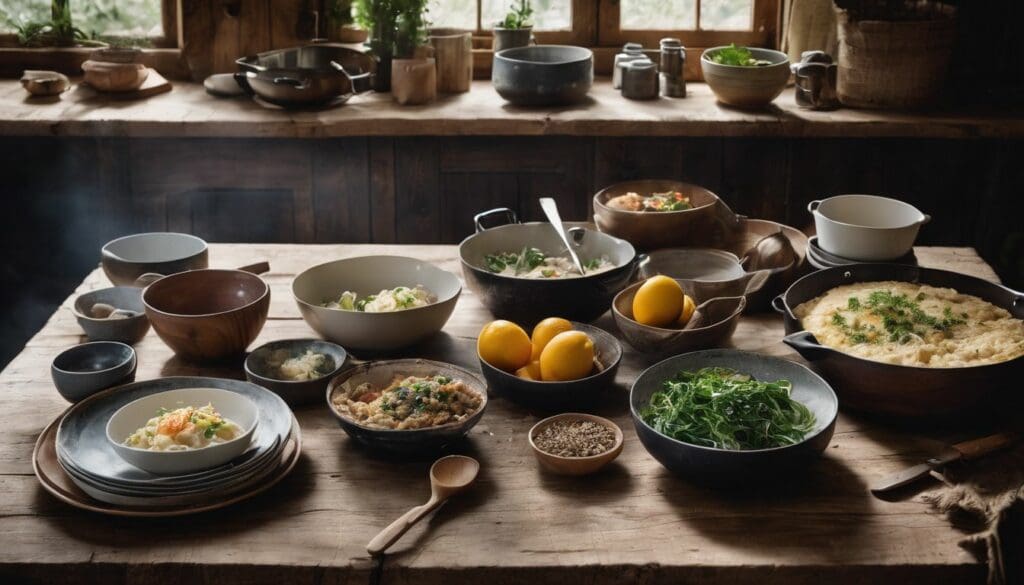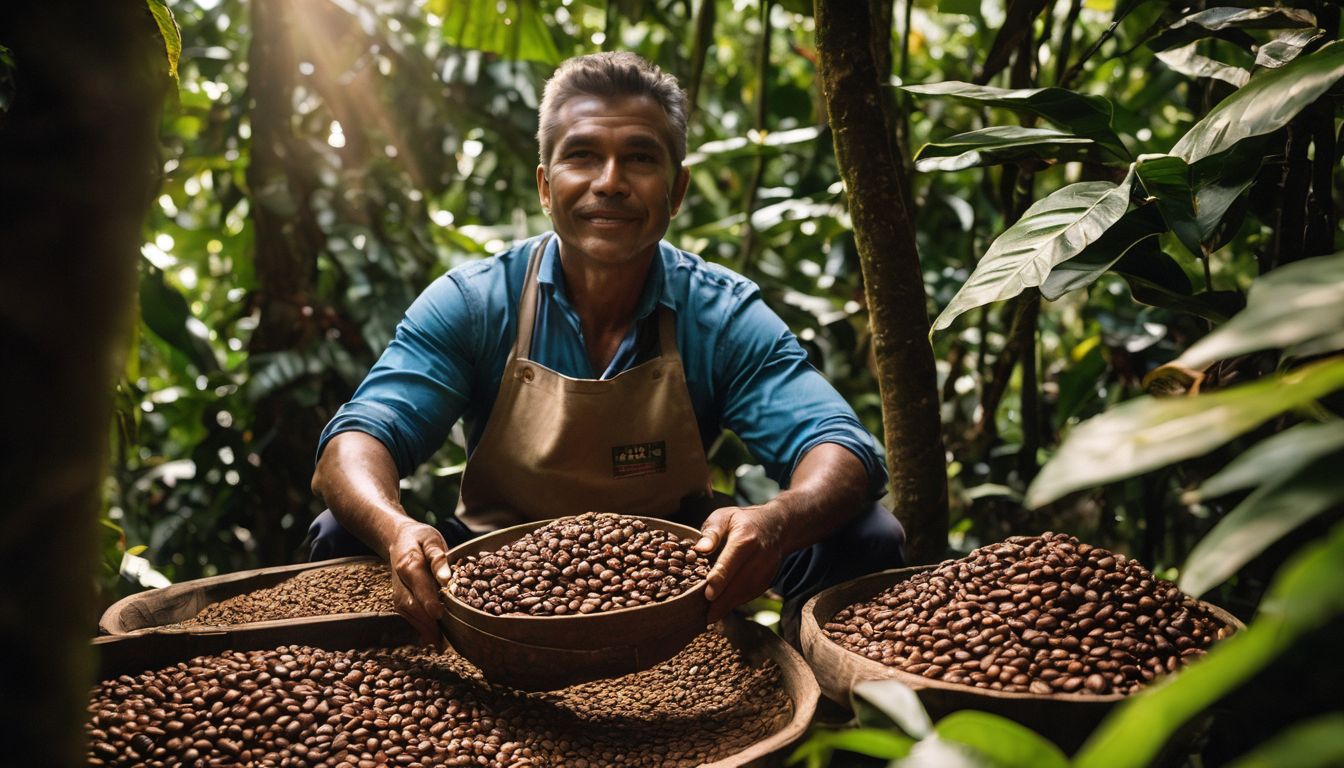In our collective journey to embrace a kinder way of living with the Earth, the humble kitchen emerges as a crucial frontier in our fight to curtail waste. Like you, we’re acutely aware of how traditional kitchen items can inadvertently contribute to the planet’s distress.
It’s quite startling when you consider that over 300 million tons of plastic are churned out annually, with an astonishing amount destined for just one brief use. Our carefully curated guide brims with thoughtful alternatives and environmentally savvy choices designed to transform your culinary haven into a beacon of sustainability.
So why not roll up your sleeves and join us as we venture together towards a more eco-friendly kitchen?.
Key Takeaways
- Switching to sustainable kitchenware like stainless steel containers and beeswax wraps helps cut down on single-use plastics, reducing waste and minimising the release of harmful chemicals into our food.
- Non – toxic cookware options such as ceramic or cast iron are free from PTFE and PFOA, ensuring healthier cooking methods and avoiding the risk of leaching toxins at high temperatures.
- Using eco – friendly sponges, brushes, and reusable straws made from materials like bamboo or silicone can significantly reduce household plastic use while maintaining clean kitchens.
- Investing in zero – waste coffee systems, like reusable filters, contributes to a reduction in daily waste generation while supporting ethical sourcing practices with fair trade coffee purchases.
- Incorporating organic cotton hand towels into your kitchen routine not only reduces dependence on disposable paper towels but also supports sustainable farming as they are made without pesticides.
The Importance of Sustainable Kitchenware
Traditional kitchenware often contains harmful chemicals like BPA and phthalates, which can leach into food and cause health issues. Sustainable options are non-toxic, durable, and better for the environment.
Making the switch to sustainable kitchenware not only benefits your health but also reduces waste and supports ethical production practices.
Harmful effects of traditional kitchenware
Many of us don’t think twice about the pots and pans we use to cook our food. Yet, some traditional kitchenware is lined with chemicals that could leach into our meals when heated.
Non-stick coatings often contain PTFE and PFOA, substances linked to health concerns ranging from minor ailments to serious diseases. Imagine frying an egg on a pan that silently offloads toxic compounds – it’s unsettling.
Cast iron skillets have been around for centuries, but if they’re not properly cared for, they can rust and add unwanted iron into your diet. Plastic utensils may seem harmless but can release BPA or phthalates when used with hot dishes; these disrupt hormones in humans and wildlife alike.
We stand for healthier cooking environments by opting for ecofriendly kitchenware free from harmful toxins, ensuring peace of mind while whipping up family recipes.
Benefits of using sustainable options
Making the switch to sustainable kitchenware and utensils benefits our planet by reducing waste and minimising environmental impact. By choosing eco-friendly alternatives like stainless food storage containers, beeswax wraps, and reusable straws, we contribute to a healthier ecosystem.
These ethical choices for nontoxic cooking tools not only promote sustainability but also support conservation efforts. Opting for zero-waste storage solutions such as plastic-free food storage and biodegradable kitchenware helps us take a step towards a greener future.
Investing in renewable utensils like bamboo serving boards and eco-conscious cookware not only enhances our kitchen experience but also aligns with our commitment to protecting the environment.
Sustainable Kitchenware Products
Looking for eco-friendly and sustainable kitchenware options? We’ve got you covered with stainless food storage containers, beeswax wraps, reusable straws, and zero-waste coffee systems.
These products are not only good for the environment but also convenient for everyday use in the kitchen.
Stainless food storage containers
Stainless food storage containers are a durable and eco-friendly option for preserving your food. These containers are reusable, BPA-free, and long-lasting. They keep your food fresh without the need for single-use plastics.
Stainless steel is also non-toxic and easy to clean, making it a safe and convenient choice for storing all kinds of food.
Investing in stainless food storage containers is a practical step towards reducing waste in our kitchens. Their versatility makes them perfect for packing lunches, storing leftovers, or organising pantry items.
Plus, they are fully recyclable at the end of their life cycle, reinforcing their positive impact on the environment.
Beeswax wraps
Beeswax wraps provide a sustainable alternative to plastic wrap for food storage. These wraps are made from organic cotton infused with beeswax, tree resin, and jojoba oil, creating a natural and reusable solution for keeping food fresh.
They can be used to cover bowls or wrap around produce, cheese, bread, and sandwiches. The warmth of hands softens the wax enough to mold it around items or seal edges together without leaving any residue.
Beeswax wraps are an eco-friendly choice for reducing waste in the kitchen while keeping food fresh.
When caring for beeswax wraps, simply wash them with cold water and mild soap before letting them air dry. Avoid using hot water as it can melt the wax coating. With proper care and use, these wraps can last up to a year and are compostable at the end of their life cycle.
Eco-friendly sponges and brushes
Eco-friendly sponges and brushes offer sustainable alternatives for everyday kitchen cleaning. These products are made from natural materials such as bamboo, coconut fibres, or loofah, making them biodegradable and compostable.
They provide effective cleaning without harmful chemical residues, reducing the environmental impact. By choosing eco-friendly sponges and brushes, you can contribute to a healthier planet while maintaining a clean and hygienic kitchen environment.
Using these ethical kitchen products aligns with the principles of zero waste living and environmentally conscious choices. Sustainable utensils like these can easily replace traditional synthetic options without compromising on functionality or effectiveness.
Reusable straws
Having covered eco-friendly sponges and brushes, we now turn our attention to reusable straws. Using reusable straws helps reduce the need for single-use plastic alternatives that contribute to environmental pollution.
By opting for materials such as stainless steel, silicone, or bamboo for your straws, you can actively participate in reducing plastic waste while enjoying your favorite beverages.
Reusable straws are a simple yet effective way to make a positive impact on the environment.
Zero-waste coffee systems
When considering sustainable kitchenware, it’s essential to think about zero-waste coffee systems. Opting for a reusable coffee filter can significantly reduce single-use waste while also saving money in the long run.
Additionally, investing in a durable and eco-friendly coffee mug eliminates the need for disposable cups and helps cut down on plastic waste. By choosing to brew your own coffee at home with these sustainable alternatives, you can decrease your environmental footprint and enjoy your favourite beverage guilt-free.
To further minimise waste, consider purchasing fair trade, organic coffee beans that come in recyclable or compostable packaging. This not only supports ethical sourcing practices but also ensures that every step of your morning routine aligns with eco-conscious values.
Eco-Friendly Cooking and Baking Supplies
When it comes to cooking and baking, using non-toxic cookware and natural utensils is essential for maintaining a sustainable kitchen. Organic cotton hand towels are also a great eco-friendly option to consider for your kitchen.
Non-toxic cookware
When choosing non-toxic cookware, look for options made from stainless steel, ceramic, cast iron, or glass. These materials are free from harmful chemicals and do not leach toxins into your food.
Additionally, they are durable and long-lasting, reducing the need for frequent replacements and minimising waste. It’s important to avoid non-stick coatings containing perfluorooctanoic acid (PFOA) or polytetrafluoroethylene (PTFE), as these can release harmful fumes when heated at high temperatures.
Opting for non-toxic cookware not only benefits your health but also contributes to a more sustainable kitchen. By investing in eco-friendly cooking equipment such as stainless steel pots and pans or cast iron skillets, you’re making a positive impact on the environment while creating healthier meals.
Natural cooking and baking utensils
Transitioning from non-toxic cookware to natural cooking and baking utensils, we find a range of eco-friendly options available. Opt for bamboo or wooden spatulas and spoons, which are sustainable alternatives to plastic utensils.
Look for organic cotton oven mitts and pot holders as they are non-toxic and biodegradable, reducing your environmental impact while cooking and baking. Additionally, consider using silicone baking mats instead of disposable parchment paper for a more sustainable option that reduces waste.
When it comes to choosing kitchen tools and utensils, we encourage considering environmentally friendly options like bamboo or wooden tools as well as reusable silicone baking mats to reduce waste in the kitchen without compromising on quality or functionality.
Organic cotton hand towels
Transitioning from natural cooking and baking utensils to sustainable kitchenware for cleaning, let’s discuss the benefits of using organic cotton hand towels. Made from organically grown cotton, these towels are free from harmful pesticides and chemicals, making them a safe and eco-friendly choice for your kitchen.
Organic cotton hand towels also offer superior absorbency, allowing you to tackle spills and messes with ease while reducing the need for disposable paper towels. Additionally, by choosing organic cotton hand towels, you are supporting sustainable farming practices and contributing to a healthier environment.
When seeking nontoxic alternatives for your kitchen, consider incorporating organic cotton hand towels into your daily routine. These environmentally friendly options provide a simple yet impactful way to reduce waste and promote sustainability in your home.
Sustainable Serving and Dining Options
Choose recycled glass cups and plates, bamboo serving boards and utensils, as well as non-toxic cleaning supplies for a more sustainable dining experience. These eco-friendly options are not only better for the environment but also add a touch of natural beauty to your kitchen and dining table.
Recycled glass cups and plates
Sourcing recycled glass cups and plates is a sustainable choice for reducing waste. The process of creating these products uses less energy and resources compared to producing new glass items, making them an environmentally friendly option for everyday use.
Using recycled glassware also reduces the demand for raw materials, which helps in conserving natural resources such as sand and limestone.
Opting for recycled glass cups and plates supports the circular economy by diverting waste from landfills into useful products. These eco-friendly alternatives are durable, versatile, and add a touch of elegance to any dining setting.
Bamboo serving boards and utensils
Bamboo serving boards and utensils offer a sustainable and stylish alternative to traditional options. They are durable, lightweight, and naturally antimicrobial, making them ideal for serving food.
Bamboo’s rapid growth also makes it an eco-friendly choice, as it can be harvested without causing deforestation or environmental harm. These products are perfect for environmentally conscious individuals who seek sleek and practical kitchenware that supports conservation efforts.
Using bamboo serving boards and utensils not only adds a touch of natural elegance to your dining experience but also contributes to reducing plastic waste in the kitchen. The versatility of bamboo allows for various shapes and sizes of serving boards and utensils, catering to different needs while promoting sustainability in our daily lives.
Non-toxic cleaning supplies
When choosing non-toxic cleaning supplies for your kitchen, consider opting for natural alternatives such as vinegar, bicarbonate of soda, and lemon. These ingredients are effective in removing grease and grime without harmful chemical residues.
Look for eco-friendly dish soaps and all-purpose cleaners that are free from synthetic fragrances, dyes, and toxic chemicals. Additionally, reusable cleaning cloths made from organic cotton or bamboo are sustainable choices that reduce waste and minimise environmental impact.
Investing in non-toxic cleaning supplies not only promotes a healthier home environment but also contributes to reducing water pollution and minimising harm to aquatic life. By making conscious choices in selecting environmentally friendly cleaning products you can help create a safer living space while minimising your carbon footprint.
Tips for a Zero-Waste Kitchen
Composting food scraps, using safer appliances and investing in a water filter are just a few ways to create a zero-waste kitchen. To discover more tips and learn about sustainable kitchenware and utensils, keep reading our guide for environmentally conscious individuals.
Composting food scraps
When composting food scraps, remember to use a designated bin for collecting organic waste. Make sure to chop up large food pieces into smaller pieces before adding them to the compost pile.
Layer kitchen scraps with yard waste and mix in some shredded paper or dry leaves for balanced decomposition. Turn the compost regularly to aerate it and speed up the process. Once the compost is dark, crumbly, and earthy-smelling, it’s ready to be used as nutrient-rich soil amendment in your garden.
By composting food scraps, we reduce methane emissions from landfills and enrich our soil naturally without harmful chemical fertilisers. This simple practice helps divert waste from landfills while contributing to a healthier environment for all living things.
Using safer appliances
When choosing kitchen appliances, opt for energy-efficient models that are certified by reputable environmental organisations. Look for appliances with the Energy Star label to ensure they meet high efficiency standards and consume less energy.
This not only reduces your carbon footprint but also lowers your utility bills over time. Additionally, consider investing in induction cooktops which use electromagnetic technology to heat pots and pans directly, minimising heat loss and cooking food faster.
These appliances offer a safer and more sustainable alternative to traditional gas or electric stoves.
Investing in a water filter
Investing in a water filter can help reduce the use of single-use plastic water bottles, cutting down on plastic waste. It ensures access to clean drinking water by removing contaminants such as lead, chlorine, and bacteria, promoting a healthier lifestyle.
A quality water filter also contributes to reducing the carbon footprint associated with bottled water production and transportation. By choosing an eco-friendly option like a reusable filtered water system, you are actively supporting conservation efforts and reducing environmental impact.
Not only does investing in a water filter provide immediate benefits for your health and the environment, but it also leads to long-term cost savings by eliminating the need to purchase bottled water.
Conclusion
In conclusion, sustainable kitchenware and utensils offer a range of benefits for both the environment and our health. Choosing eco-friendly options such as stainless food storage containers, beeswax wraps, and non-toxic cookware can significantly reduce our impact on the planet.
By making simple changes like using reusable straws and composting food scraps, we can all contribute to creating a more sustainable future. Making these small adjustments in our daily lives is an impactful way to support environmental conservation efforts while also promoting healthier living.
FAQs
1. What exactly is sustainable kitchenware and utensils?
Sustainable kitchenware and utensils are eco-friendly cooking tools made from non-toxic materials designed to reduce waste in your kitchen.
2. Can I find zero-waste storage options that are also plastic-free?
Absolutely! Zero-waste storage solutions include reusable food storage options, such as beeswax food wraps and eco-friendly Tupperware.
3. Are there any environmentally friendly cleaning products for my cookware?
Yes, natural soaps offer an earth-conscious choice for keeping your sustainable cookware clean without harming the environment.
4. How can I ensure my cooking practices are green?
To maintain a green kitchen, use ethical kitchen utensils, organic kitchenware, and recyclable products whenever possible during meal prep and dining.
5. What makes an item of kitchenware ‘eco-conscious’?
Eco-conscious cookware refers to items manufactured with care for the planet in mind; this means they’re often made from renewable resources and designed with sustainability at their core.





